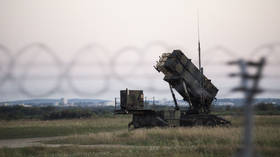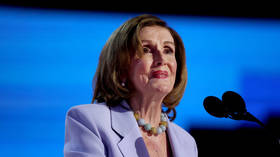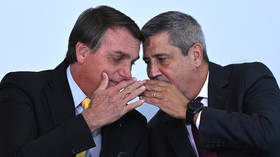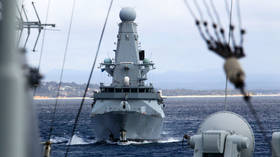Interview with Raad Al-Hamdani
Lieutenant General Raad Al-Hamdani, the Commander-in-Chief of the second corps in the Iraqi Republican Army gave an exclusive interview to Rusiya Al-Yaum – Russia Today’s sister channel, broadcasting in Arabic.
RUSIYA AL-YAUM: Today marks the fifth anniversary of the invasion of Iraq, from which Iraqis are still suffering. Welcome Lieutenant General. What's the actual date that marks the beginning of the war against Iraq?
General Raad Al-Hamdani: Actually, there are two dates; the first is the strategic date which means that the 1991 war continued strategically after its end on February 28 1991. This means that the political results of that war, which was called by the Iraqi leadership the Umul-Maarek (Mother of Battles) did not come to an end. Hence, strategically, the war which began on January 17, 1991 did not end until April 4, 2003. This is on the strategic level. On the field level, the exact date of the recent war was at dawn of March 20, 2003.
RUSIYA AL-YAUM: Then, as you say, the war began at dawn of March 20, 2003, with an intensified bombardment and shelling; following information obtained by special American sources that confirmed the presence of the late Iraqi president in Al-Mansour district in Baghdad. This is the actual date of the beginning of the war. How did you react to that first very intensified attack?
General Raad Al-Hamdani: On a field level, and with respect to my troops; I issued operational commands on March 15, which was the time of the arrival of the American 101 Airborne Division to Kuwait. This was important criteria to me for the seriousness of the war. Accordingly, the first psychological orientation towards the war began on March 15. On the eve of 18 and 19, there was an air warning announcing the arrival of 20 enemy air targets which entered the Iraqi territories from the western desert; passing over Nassiriyah city, then over Iskandariya; after which they changed their directions. Hence, the first attack, took place exactly at hour 55 at dawn; there a formation of American F 117 Stealth Fighters which heavily bombarded the private ranch of the late president's daughter. I think they believed that the head of the Iraqi leadership was there. After that, the late president appeared before the media in another place and made a speech. His speech, however, was cold and not enthusiastic. This is why the war began in a cold way, not a fierce one. After that, over 40 to 45 missile attacks were launched against different targets throughout the capital Baghdad. The actual fierce time of the war began on the second night; which was known as Assadma Wal-Tarweea' [Shock and Frightening]. Baghdad was bombarded very heavily and savagely; over 1500 guided missiles, and more than 550 laser-guided bombs launched by B 51 bombers on Baghdad. Part of these guided bombs weighs more than seven tonnes. Therefore, the war began coldly; and it was questionable as regards the targets aimed at; but on the second day; it appeared that there was a severe hot war, very severe war in fact.
RUSIYA AL-YAUM: Apart from your being a grand officer in the Iraqi army; you are a strategic analyst; do you think that that mode of attack; cold at the beginning, and then turned to be fierce and severe; do you think it settled the following battles, especially when we know that the Iraq army was not well prepared for such a war due to many known reasons such as poor arming and the fatigue it underwent throughout the years of the sanctions?
General Raad Al-Hamdani: On the strategic, field, and psychological levels, as well as the will to fight, actually, we did not have any glimpse of hope to win the war. The Iraqi army was exhausted, the war did not end with respect to the air conflicts; it was continued outside the no-fly zones imposed by the USA and Britain, in violation of the international law; accordingly, the republican army and the leadership headquarters were subject to continuous attacks throughout the period between 1991-2003. Besides, we did not have the minimum air defence utilities. All these factors made us convinced that we can never win the war. However, our duty towards our country, and our military honor forced us to fight to the end.
Nine months before the war began; I submitted this issue before the late president in a meeting. I clarified to him that if the high Iraqi strategy can not avoid the coming war, we should then change the mode of our strategic and tactical thought towards a kind of guerrilla fighting, which then I named as the Partial Use of Power, and dividing all Iraqi territories from the north to south and from the west to the east into sectors that are run by traditional forces which fight as guerrillas.
RUSIYA AL-YAUM: Did the late president take your plan into consideration; did he listen to it; especially as we know that he was a stubborn man and listened to nobody; besides, when he appointed his younger son Qusay, as the commander–in-chief of the military operations; by this step he removed all expert commanders who had great expertise in the matters of war?
General Raad Al-Hamdani: Well yes. He did listen to me carefully. He was known to be a good listener. He listened to me for over 45 minutes; and when another commander wanted to intervene; he prevented him and told him that he is interested in what Lieutenant General Raad Al-Hamdani is saying. However, he did not agree to my proposition, nor did he agree to what other commanders said, especially with respect to the commandment of the army. He then took a decision which was practically, correct. This decision provided for dividing Iraq into four territories of commandment and general control. What was wrong about that decision was that the commanders of these territories were political commanders, not military commanders. The ministry of defence and the army staff commandment were not given a leading role in that war. There mission was simply securing logistic and field requirements for the main four commandment sectors.
RUSIYA AL-YAUM: So, do you think that was the main reason for the fall of Baghdad in that war, especially when we know, and definitely you know as well, that many regions in the southern Iraq resisted the invasion in manner which can be called legendary, as they fiercely fought the well-equipped American army. Can you sum up what were the essential reasons that led to the fall of Baghdad, the capital of the Arab caliphate?
General Raad Al-Hamdani: There were many reasons behind the fall of Baghdad. Certainly, three weeks can be reasonable with respect to differences in the power balance in that conflict. In modern history, for instance, great France fell within two weeks before the Nazi invasion in the second world war. In fact, the fall of Baghdad started on August 2, 1990, with the consequent sanctions; the exhaustion of the state, the army and the Iraqi people and the whole Arab nation as well, as a result. There was a huge amount of factors, the end of which represented the last stroke that broke the camel's back. The fall of Baghdad came as a result of the factors which fastened the will of not fighting. The first successful fighting for the Iraqi army, especially in Um Qasr and Basrah were due to the facts that the fight had just started; and the enemy was within the range of our arms.
However, the Americans used distant manoeuvring which kept their forces outside our reach. For instance, the Fifth American Corps, which was under the command of General Watts, moved through the desert approach near the Euphrates River. This approach was outside the effect of all our arms, except some cannon shots, which are called movable or temporary positions; which is a style we use only for marking targets. We used it so that we would not give a chance for the enemy fighters or helicopters to destroy these cannons. Hence, if the manoeuvre of the enemy is outside the effect of your arms; and the tank which you rely on in the field has no air cover and is not protected by any other arm. Moreover, we had the Abrahams American Tank which was in the field against the Iraqi T 72 Soviet Tank, and this was totally outside our technical measurements. Fighting depends on how modern your fighting system is.
Now, the latest tank which we owned was T 72 , of Soviet origin, which I received back in 1982 when I was the commander of a Tank Battalion in the Republican Army. For the other side, each American tank was protected by an Apache fighter which carried 16 anti-tank missiles named, Hellfire, which worked within a system of Fire and Forget. The range of these missiles was 8 KM; while the maximum direct seen shooting range for the Soviet T-72 tank was 5 KM. Over the Apache, there was another F16 fighter which could spot targets within 80 KM. Over the two fighters, there was a F 15 fighter, which could spot targets within 120 KM. Over these fighters were Blackbird espionage fighters, above which flew the Awax fighters. Above all these flew the reconnaissance air systems; while the Iraqi tanks fought all alone; and we had only simple defence arms.
Besides, our air defence systems was also incomplete; therefore, we relied on the free – ambush manner in which you assign an expected mission, we did not work through a mutual shared intelligence system. The battle was unbalanced; and the enemy, with its huge equipment and modern technology, was capable of movement and managed to separate our troops from each other, at the time it remained outside our fire range. Consequently, our army felt greatly disappointed, and despite their courage, our soldiers were not capable of manoeuvring and fighting in the way the enemy did. In addition to the foreign propaganda and media; and the opposition parties; as well as the Iranian media, which played a very vital role in discouraging our army. Added to this is the absence of political awareness.
Generally, political awareness in the Arab world is absence. The enemy managed to push for the end of the troubles in Iraq by removing Saddam Hussein. These propaganda strategies were not very well comprehended by the Iraqi people in general and the Iraqi army personnel in particular.
RUSIYA AL-YAUM: General, you have mentioned that the removal of Saddam Hussein would put an end to the crisis in Iraq; there were many initiatives, Arab as well as Russian, all of which called for the late president to leave power. Do you think his giving up of power would end the crisis? Secondly, many think that the late president Saddam Hussein did not believe America would launch a land war; he believed, until before the beginning of the war, that the war would be similar to the first Gulf War. What are your comments on this?
General Raad Al-Hamdani: Everything you mentioned was true. At a stage, president Saddam believed that any arrangement he makes would be useless. If the strategic goal of the war was the regime itself, and the head of the regime, it was courageous of him to face his destiny. We believed that president Saddam relied heavily on his good luck; and he believed that he had a mission to perform under the protection of Almighty Allah.
In his answer to one question, he said : "do you know why we would humiliate America and make it kneel at the gates of Baghdad, this is because Allah did not prepare any army for them expect the army of Iraq; if America fought with the Ex-Soviet army; people would have said that a great power is fighting a great power; but when it comes to the Iraqi army, which was exhausted, tired and poorly armed and manages to humiliate and defeat the American army, this is all done under the Divine protection and care.
There was a feeling that the very last moment of the war would be decisive and triumph would be to Iraq through the protection and care of Almighty Allah. It is noticed that the late president Saddam Hussein, after any crisis throughout these fifteen years, he goes to cross the Tigris from the same place he crossed in 1959 when he was saved by his good luck.
Hence, he was optimistic, and he was thinking in the same manner Great Fredrick did in the decisive moment, Allah would be with us, after the death of Katrina, the Czaress, and the European alliance against the Germans collapsed. Such was his feeling, and such is the feeling of all leaders who believe themselves to be very important. He also believed that Russia would be the final solution.
Strangely, though I did not attend that meeting because I became far behind the enemy forces; in the morning of April 7, while the American forces were moving to Baghdad from the north, west, east and south of Iraq, he raised his hands triumphantly, saying the victory was in his hands. He was very steadfast, and quiet. On April 6th, while he was sitting in a bus stop near Umul-Tubul Mosque in Baghdad, American tanks passed through the highway leading to the airport. He was astonished and asked – what are these tanks? A brigadier, named Hameed, answered him that these are American tanks. Very quietly, he pushed his aids to fight, and two of these tanks were destroyed. He was extremely quiet, and dealt with things as if luck is on his side, and Allah would not forget him.
RUSIYA AL-YAUM: In the same context, and stemming from this very astonishing notion of his that victory would be his, he did not issue commands to destroy bridges in Iraq.
General Raad Al-Hamdani: This is a witty notice by you. Let me give you an example. Three months before the war, I took the commander in chief of Al-Madeena Al-Munawara division of the Republican army and his officers and we all stood over a big bridge known as Al-Qaed bridge (the leader bridge) in Jurful-Sakhar region over the Euphrates river. I told them that the enemy would cross this bridge.
This bridge is similar to the one over the Rhine which the American Sixth division crossed in 1944 and settled the Rhine battle. Despite this expectation, I assigned a force to destroy the bridge; and I assigned a commander for this force. I also authorized the commander–in-chief of Al-Madina Al-Munawwara division to destroy the bridge the moment they feel the enemy would cross it. Ten days before the beginning of the war, I consulted the supervisor of the Republican army, Qusay Saddam Hussein, God bless his soul, about this bridge. I said to him that this bridge would be an important part of Baghdad’s defence system. I preferred to destroy the bridge right then. He asked to wait until he asks the permission of the president. The answer was, no. The same thing was true for many other bridges, like Al-Kifil bridge over which a fierce battle took place on March 26 2003, which was lost by the Iraqi troops. The problem continued.
On April 2, 2003, I was summoned to Baghdad to meet with the president as the commander in chief of the Armed forces; however, I met with the defence minister and with Qusay Saddam, God bless his soul. At that moment, I had my own information; I knew the place of the enemy; I had my own deep reconnaissance forces which supplied me with information about the moves of the enemy, especially near the Euphrates. These forces were in civil uniform and led by a courageous man called Maad Al-Juheishi. I insisted on destroying the bridge and the meeting lasted for three hours. We also discussed other issues.
At the time I was in need for more troops; they demanded that I withdraw other troops. They believed that was not the real effort of the enemy; and the actual forces would approach us from the west, from the Jordanian borders. There measurements were not punctual; and more American troops were arriving; they occupied Al-Majar; and the 82nd Airborne division landed over Haditha and occupied the Haditha dam.
As discussions were going on, the phone rang; and it was I who picked it up. The speaker told me that the enemy is crossing the bridge and that news was very painful. I returned very quickly; and a battle began. Many of our forces were involved; the engineering units, the 10th Brigade, and other forces, but we lost the battle due to the fierce air strikes. We tried to restore the bridge back before the dawn of April 3, but we failed.
RUSIYA AL-YAUM: A lot has been said about the Airport Battle and about the arrival of the late president and his participation in that battle; can you enlighten us about the details of that battle? What were the losses of the American forces and the Iraqi forces in this war which ended on April 9?
General Raad Al-Hamdani: The enemy knows its target exactly and as a matter of fact I had reminded the general command about this target earlier. I concluded this from an article which was published by the Israeli journal Haaritz, or Maarif, I am not sure about its name. The article concentrated on a meeting between Ariel Sharon, the then Israeli prime minister and the American president. The Israeli prime minister stressed that it would be embarrassing to America should the Israeli army joins the coalition. However, he told him that the weakest point in Baghdad is the southern-west region where the airport and presidential palaces lie. If this speech was true; the Americans, who are witty enough, know that this point is called the very vital point. There are vital points, and very vital points. The Airport, for Airborne units which have a great ability for manoeuvring was very vital.
Even if the fight continues inside Baghdad, while the American forces occupy the airport and the surrounding presidential palaces; this would be enough to declare the achievement of the seizure of the target. What happened was that the defence battle for the airport was also not within the correct measurements. In the meeting I talked to you about, I clarified to the president that this war may not come within the measurements we expected. I gave an example; we began training my corps troops, whose number amounted to 10044, about individual technique fighting. This is because we expected a landing by the enemy forces over the corps headquarters. Hence, we should fight as individuals.
The president was attracted by this idea; and turned to his secretary, Abid Hamood and said, “Did you understand what general Raad said? This means that the enemy might land over the airport.” He then asked him to tell me the steps taken to protect the airport. All I understood from his secretary was that there was an emergency battalion who moved some hours ago to block the airport. The private republican guard was in charge of protecting the airport. Yet, it was not qualified for such missions. The republican army did not perform such field practices due to security measurements. Fidaeyo Saddam (Saddam's Self-Sacrificers) were also there and fought in the battle.
The Iraqi forces did not expect such a big force would attack the airport. The battle began, and our soldiers from the republican army, the private guard and the Fidaeyeen fought honourably. The enemy, however, used very influential weapons in that battle. Excuse me, I cannot tell what kind of weapons these were, but they were very influential, to the extent that the airport was closed for a long period of time. The real fight took place in the eastern entrance of the airport, in Umul-Nisoor square. President Saddam and Qusay Saddam were seen in the battle field more than once, supervising the battle. Truth should be mentioned here, many soldiers were martyred in this battle, from the republican guard, the private guard and the Fidaeyeen. Our forces did not stand long in the face of the enemy.
As for the enemy's losses, and according to one correspondent who accompanied the American forces in this battle, there were not less than 600 personnel killed in this battle field. This quick loss of the battle gave the conclusion that there was treason among the Iraqi army; in addition to the news spread by the media that there were pre-war deals with high commanders in the republican army; and I defy the Americans to mentioned just one name or one deal with a commander who betrayed his country. Treason does not suit the Iraqi military; it’s a disgrace. Regardless of any political aim or any other aim; treason dishonours a man; so, definitely it disgraces the military and national honour.
RUSIYA AL-YAUM: Being a politician and a military man; what is the future map of Iraq?
General Raad Al-Hamdani: I might not give the correct answer because I am not a politician; rather I am surely a military and strategic man, both of which meet to some extent. The situation in Iraq now demonstrates a huge strategic crisis in which all parties are involved. This strategic crisis is due to the wrong American vision of occupying Iraq or the After Saddam Hussein Iraq. An Alliance is currently underway that agreed on our current situation.
The stupidity of the American strategy, and the domination of the new conservatives, who are now being called the new idiots, in imposing certain criteria as regards supporting the strategic position in regards to Iraq. Sure the United States is a superpower, and has its own decision-making institutions, a respectful military institution as well as a political institution. However, it appeared that the domination of the new conservatives had led to imposing strategic criteria on which the war was built, on top of which was destroying the Iraqi army, toppling the regime and occupying Iraq.
The second factor which helped the American in this war is a strategic misappreciation on the part of the Iraqi command. There was a merging between Saddam Hussein, being a strategic and political leader of Iraq, and Iraq as a State. Those who know the personality of Saddam Hussein knows that there was no clear separation between Saddam and the State. And as Brachtisch, who was the general commander in chief of the German forces from 1938-1941, who refused the plan of attacking the Soviet Union; he said that Hitler was German's Destiny; and no one could change that destiny; the lesson is in studying the present so that we can see the future. This speech applies to us in Iraq. Saddam Hussein was our destiny, and things came to such an end with all its disadvantages and advantages. No one was able to change this destiny.
Any way you look at what happened, we figure out that there was a change in the international strategy which Iraq and the Iraqis paid for. The second point is the Iran-Iraq struggle with Iraq after the success of the Islamic revolution in 1979. Throughout this war, and the previous struggle during the Shah regime, Iran could not achieve its goals. However, in this war, the Iranian leadership, who comprises religious men believed to be coming from the past in the strategic measurements, managed to deal very wittily with the war in Iraq. They managed to bring down a very big foe, Iraq and Saddam, for very little price, through the American and European alliance. The Americans put a very weak political project. The current problem in Iraq is a political one, in addition to the security issue. They also put sacred schedules for democratic changes to be made in Iraq. Democracy, as we know, is history and heritage.
Yet, Paul Bremer, the civil governor of Iraq after the toppling of the regime, who was the modern Holacko, wanted to shorten the way to democracy through making alliances with the clerics and through religious dictatorship. He therefore put rules for a new political game. The Americans after then confessed their mistakes but they continued. Problems appeared and accumulated to the extent they destroyed Iraq and the Iraqis. Malice was everywhere. We as a third world country rely on the elite in a transitional period; hence, the common people were set free to terminate the elite. Power is not an end; rather it should be a means to building a state. The British in 1921 came with a project of building Iraq, so they brought skilled elite, who were also Sunnis, Shiites, Christians, Kurds, Mandeans, Yazidis, but unfortunately, the Americans came with the project of destroying the state; and who adopts such a project does not need skills. A powerful bulldozer would be enough to destroy it.
The current political map is simply a map for conflicting political powers in which no powerful one dominates. Iran is the big winner from the situation in Iraq, it achieved imaginary goals. The Americans, up to the end of the current administration and for three months with the coming of the administration will not be able to take a big strategic decision. Unfortunately, there is no regional power that can balance the power of Iran in order to protect the interest of the country and the Iraqi people. All Iraqis would regret, those who participated in the political process, and those who stood against it, because the outcomes within the coming 5 to 10 years would be painful and Iraq would not become as it was, with its huge strategic weight within the Arab world, unless with a miracle, a miracle that awakens the Iraqis and forces them to leave behind their conflicts and stupid malice; these fearful numbers, over one million and a quarter dead; these should not be useless. What is the difference between a Sunni, a Shiite, and others? Such is Iraq.












